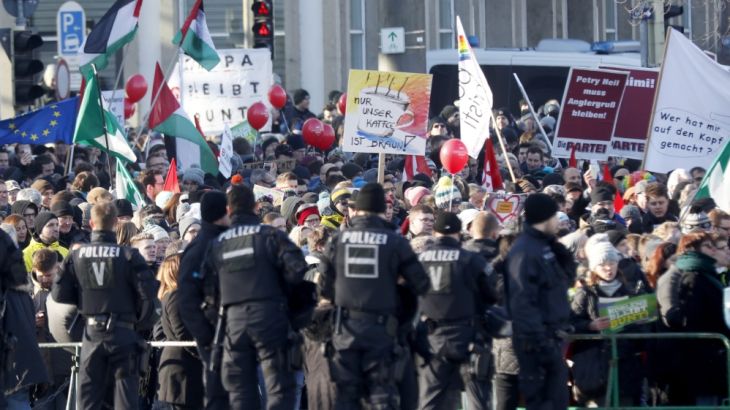Thousands protest over far-right conference in Koblenz
Far-right leaders from Germany, France, Italy and elsewhere gather in German city of Koblenz amid demonstrations.

Left-wing protesters staged a demonstration outside a conference held by Europe’s far-right parties in the German city of Koblenz on Saturday.
More than 3,000 demonstrators gathered, while some staged a sit-in outside the hall. They shouted slogans such as “no border, no nation, stop deportation”.
|
|
More than 1,000 police officers were deployed in the city before the demonstrations.
Not far away, demonstrators from the global Avaaz activist group placed statues of Adolf Hitler, Benito Mussolini and Josef Stalin, among others, in front of a landmark statue of German Kaiser Wilhelm.
Speaking to Associated Press, Avaaz organiser Pascal Vollenweider said the statues were meant to send a “strong message” to the nationalist politicians meeting that “global citizens are rejecting their old dangerous ideas”.
German Social Democratic Party leader Sigmar Gabriel was among those protesting, reported German daily Deutsche Welle.
German Green Party co-chairwoman Simone Peter and Luxembourg’s Foreign Minister Jean Asselborn were also scheduled to participate, the newspaper added.
Inside the conference, far-right leaders were bullish about their parties’ prospects.
Anti-immigration rhetoric
“We are seeing the end of one world and the birth of a new,” the leader of France’s National Front, Marine Le Pen, told supporters of right-wing and anti-immigrant parties.
Le Pen was critical of German Chancellor Angela Merkel, who received broad praise for her decision to allow hundreds of thousands of refugees and migrants into the country in 2015.
“But no one asked the Germans what they think of this immigration policy,” Le Pen said at her first public appearance in Germany.
Merkel is now under pressure as frustration grows among voters who have criticised her management of the refugee crisis.
READ MORE: The rise of Germany’s anti-refugee right
The French presidential hopeful described 2017 as “the year of awakening for the people of Central Europe”.
European nationalists were no longer on the fringe and would now set out to win majorities in elections this year in the Netherlands, France and Germany, she added.
Le Pen has been quick to claim recent anti-establishment victories by President Donald Trump and the Brexit campaign as those of a rising populist right in Europe.
![Far-right leaders honed in on anti-immigrant rhetoric at Saturday's conference [Sascha Ditscher/EPA]](/wp-content/uploads/2017/01/61d193c120854619a7a9a370ac4953d3_18.jpeg)
Speaking to Al Jazeera from Berlin, European policy analyst Nina Schick said far-right leaders were attempting to portray themselves as a “unified front” in 2017.
“The first thing to point out is that it’s certainly no coincidence that they’re meeting here today in Germany one day after the inauguration of Donald Trump,” she explained, referring to the new right-wing US president.
“They want to show themselves as being part of this global anti-establishment backlash and that they are somehow the true democratic voices and representatives of the people,” Schick said. “This is the same kind of rhetoric we saw not only in Trump’s election campaign but also in the Brexit campaign.”
‘Terrifying’
Dutch firebrand Geert Wilders used the platform to repeat his Islamophobic rhetoric, the central theme of policies that have pushed his Party for Freedom to the front in the polls in the run-up to elections in March.
The leaders of Europe’s established parties were “promoting our Islamisation”, Wilders said in a speech.
European women are now “frightened of showing their blonde hair”, the Dutch politician said, addressing the enthusiastic audience in German.
READ MORE: Far-right MP storms Athens school over refugee classes
Alterantive for Deutschland leader Frauke Petry, whose party is set to enter Germany’s Bundestag for the first time this year, accused the German and European Union governments of threatening individual and cultural freedom through “brainwashing”, which she claimed was “much worse than erstwhile socialist propaganda”.
In February 2016, Petry was criticised for her violent rhetoric after she called on German police to shoot refugees and migrants in order to “prevent illegal border crossings”.
Meanwhile, Matteo Salvini, leader of the far-right Northern League in Italy, called for withdrawal from the euro, which he called a “failed, criminal experiment”.
Hammering on an anti-immigrant theme that has seen the party rise in recent months to around 15 percent electoral support in Italy, Salvini said: “There are thousands of Italians without homes, electricity or heating, while thousands of immigrants are living in hotels.”
OPINION: Welcome to the world of Europe’s far-right
He also slammed Merkel’s migration policies and claimed that Europe’s leaders were furthering “terrorism” by taking in refugees.
The conference was organised by the Europe of Nations and Freedom (ENF), a cross-party group in the European Parliament made up of Eurosceptics and anti-migrant movements from across the bloc.
The ENF had already attracted criticism before Saturday’s gathering because organisers blocked press access for several media outlets, citing alleged bias.
Before Saturday’s conference, left-wing politician Katarina Barley, general secretary of Germany’s Social Democratic Party, called for progressives to unite against growing right-wing populism in Europe.
Speaking to the Neue Osnabrucker Zeitung newspaper, Barley described the rise of far-right movements as “terrifying”.
“These people think that each country should have only its own interests in view, even at someone else’s expense,” she said. “Such an ideology leads in the long run to wars.”
|
|